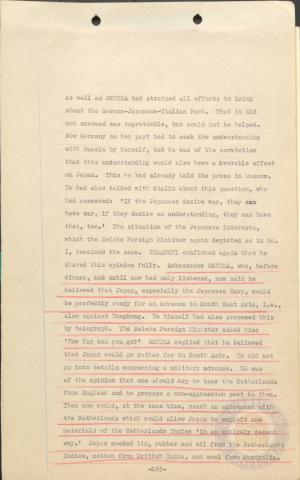
Page 165
| Parent | Collaboration Between Japan, Germany and Italy Volume III |
|---|---|
| Date | 23 February 1940 |
| Language | English |
| Collection | Tavenner Papers & IMTFE Official Records |
| Box | Box 15 |
| Folder | Japan, Germany, Italy Collaboration Vol 3 |
| Repository | University of Virginia Law Library |
as well as OSHIMA. had strained all efforts to bring about the German-Japanese-Italian Pact. That it did not succeed was regrettable, but could not be helped. Now Germany on her part had to seek the understanding with Russia by herself, but he was of the conviction that this understanding would also have a fevorable effect on Japan. This he had already told the press in Moscow. He had also talked with Stalin about this question, who had answered: fIf the Japanese desire war, they can have war, if they desire an understanding, they can have that, too.1 The situation of the Japanese interests, which the Reichs Foreign Minister again depicted as in No. I, remained the same. TERAUCHI confirmed again that he shared this opinion fully. Ambassador OSHIMA, who, before dinner, and until now had only listened, now said he believed that Japan, especially the Japanese Navy, would be perfectly ready for an advance in South East Asia, i.e., also against Hongkong. He himself had also proposed this by telegraph. The Reichs Foreign Minister asked him: 'How far can you go?' OSHIMA replied that he believed that Japan could go rather far in South Asia. He did not go into details concerning a military advance. He was of the opinion that one should -try to tear the Netherlands from England and to propose a non-aggression pact to them. Then one could, at the same time, reach an agreement with the Netherlands which would allow Japan to exploit raw
materials of the Netherlands Indies' iu. ^j^lxeljc. decent
way.' Japan needed tin, rubber and oil from the Netherlands Indies, cotton fromJgritish India, and wool from Australia.
